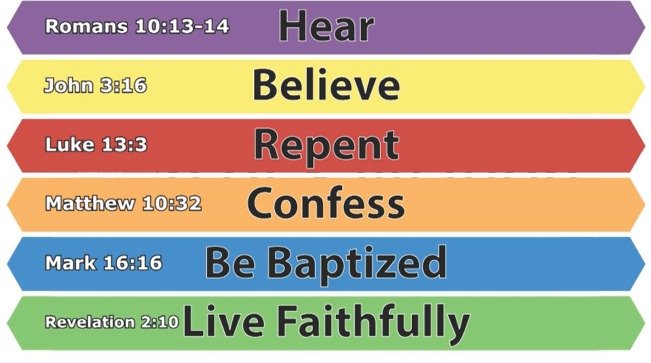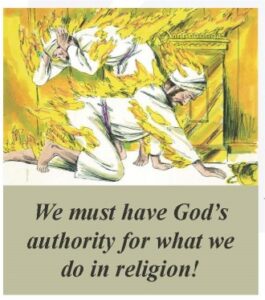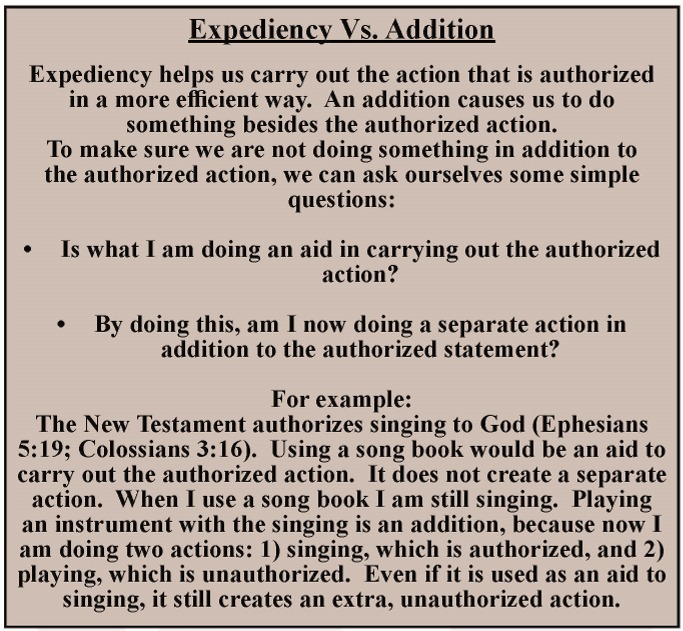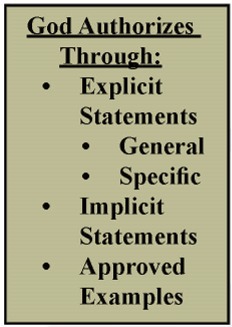Welcome to Lesson 3. After you finish reading the lesson, please scroll down to complete and submit the quiz. Your quiz will be graded by a member of the church who will then email the results to you. Thank you for allowing us to study the Bible with you.
God Speaks to Man
In the last lesson we looked at the attributes of God. We would not know these attributes just by looking at God’s Creation. God revealed this information in His communication to man, the Bible. In this lesson we will see why God spoke to man, how He has spoken to man, and how to determine what we are authorized to do or not to do by His word.
Why God Speaks to Man
To Tell Us About Him
Since we have studied the attributes of God, we have already seen one reason that God has spoken to man and that is to tell man more about Himself. In fact, it could be argued that God is telling us more about Himself in every book of the Bible.
God loves man as we are told in the Bible. “We love him, because he first loved us.” (1 John 4:19) God did not create us and then leave us alone. He wanted to tell us more about what we needed to know, including information about Himself.
To Tell Us the Meaning of Life
We can see the purpose of life explained by King Solomon. Solomon had been given wisdom and great wealth by God. He pursued happiness through different means, such as wine, women and song. But, he realized that the purpose of man was not to pursue earthly pleasures of life. That was vanity. Instead, he stated the meaning of life by saying, “Let us hear the conclusion of the whole matter: Fear God, and keep his commandments: for this is the whole duty of man. For God shall bring every work into judgment, with every secret thing, whether it be good, or whether it be evil.” (Ecclesiastes 12:13-14)
The whole purpose of man is to fear God and keep His commandments. Why? Because that is for our own good. That is what keeps us in a close relationship with our Creator. Sinning, or rebelling against God’s commandments, must separate us from our holy God who is perfect. “Behold, the LORD’S hand is not shortened, that it cannot save; neither his ear heavy, that it cannot hear: But your iniquities have separated between you and your God, and your sins have hid his face from you, that he will not hear.” (Isaiah 59:1-2) God loves us and wants us to remain with Him. We show our love back to God by keeping His commandments. Jesus said, “If ye love me, ye will keep my commandments.” (John 14:15 ASV) God created man that we might share love and be together.
To Tell Us His Commandments
We can’t keep God’s commandments and remain in His presence if we don’t know the commandments. Today, we read about God’s commandments by looking at His word, the Bible. In a future lesson we will look at how we know the Bible is communication from God. For now, notice that God has told us everything we need to know to do good and remain with Him. “All scripture is given by inspiration of God, and is profitable for doctrine, for reproof, for correction, for instruction in righteousness: That the man of God may be perfect, throughly furnished unto all good works.” (2 Timothy 3:16-17)
To Tell Us How To Be Saved
We have broken God’s commandments at some point in our lives and have earned the penalty of death, which means “a separation.” “For the wages of sin is death; but the gift of God is eternal life through Jesus Christ our Lord.” (Romans 6:23) As stated earlier, God is perfect and holy. He cannot have sin in His presence. It is our sin that separates us from God.
However, His word, the Bible, tells us about His Son Jesus. Jesus is God and was born on this earth as a man to live a perfect life and pay the penalty for our sins. God lost a perfect man when man sinned. Jesus would live a perfect life as a man and sacrifice Himself to God to give back a perfect man to God. We will see in a future lesson the evidence that Jesus is God. The Bible today tells us about Jesus and the sacrifice that was made on our behalf and how accepting that sacrifice can allow us to return to the presence of God.

Jesus died to pay the penalty for our sins. We accept that sacrifice on our behalf and wash away our sins by obeying the words recorded by the inspired writers and God.
- Hear the good news about Jesus and His sacrifice - “For whosoever shall call upon the name of the Lord shall be saved. How then shall they call on him in whom they have not believed? and how shall they believe in him of whom they have not heard? and how shall they hear without a preacher?” (Romans 10:13-14)
- Believe Jesus is the Son of God and died to pay the penalty for sins - “For God so loved the world, that he gave his only begotten Son, that whosoever believeth in him should not perish, but have everlasting life.” (John 3:16)
- Repent by turning your mind and actions against sin and turning them to following God’s commandments - “I tell you, Nay: but, except ye repent, ye shall all likewise perish.” (Luke 13:3)
- Confess that Jesus is the Son of God - “That if thou shalt confess with thy mouth the Lord Jesus, and shalt believe in thine heart that God hath raised him from the dead, thou shalt be saved.” (Romans 10:9)
- Be baptized, immersed under water, to wash away your sins - “And now why tarriest thou? arise, and be baptized, and wash away thy sins, calling on the name of the Lord.” (Acts 22:16)
- Live faithfully obeying and serving Jesus - “... be thou faithful unto death, and I will give thee a crown of life.” (Revelation 2:10b)
Don’t worry if you don’t fully understand all these things yet. A future lesson will go into more detail on the different parts of being saved. For now, realize that God loved us enough to make sure this important information was communicated to man and preserved for generations to come.
How Has God Spoken
There are so many different ways we can communicate these days, especially thanks to technology. God has used different ways and means to communicate His message, too. We won’t look at every example, but we will break down some different ways God has communicated to man based on the different dispensations.
A dispensation is really a certain way a government or authority operates during a certain time period. For our purposes, we are looking at three different ways God has operated and communicated to man during three time periods.
Patriarchal Dispensation

A “patriarch” refers to a father. So, the Patriarchal Dispensation refers to a time when God spoke directly to men and to fathers. Those people could then pass the information to others.
For example, God spoke directly to the first man, Adam. “And the LORD God took the man, and put him into the garden of Eden to dress it and to keep it. And the LORD God commanded the man, saying, Of every tree of the garden thou mayest freely eat: But of the tree of the knowledge of good and evil, thou shalt not eat of it: for in the day that thou eatest thereof thou shalt surely die.” (Genesis 2:15-17) This was before the creation of woman. It is possible that Adam told Eve about the instructions God had given. Apparently, she knew what God had said because she repeated it to the devil, who was operating as a serpent. “Now the serpent was more subtil than any beast of the field which the LORD God had made. And he said unto the woman, Yea, hath God said, Ye shall not eat of every tree of the garden? And the woman said unto the serpent, We may eat of the fruit of the trees of the garden: But of the fruit of the tree which is in the midst of the garden, God hath said, Ye shall not eat of it, neither shall ye touch it, lest ye die.” (Genesis 3:1-3) God told Adam and Adam probably repeated the instructions to Eve. This is how the Patriarchal Dispensation would work.
We later see Cain and Abel, the children of Adam, offering sacrifices to God. “And in process of time it came to pass, that Cain brought of the fruit of the ground an offering unto the LORD. And Abel, he also brought of the firstlings of his flock and of the fat thereof. And the LORD had respect unto Abel and to his offering: But unto Cain and to his offering he had not respect. And Cain was very wroth, and his countenance fell.” (Genesis 4:3-5) So, why did God accept Abel’s offering and not Cain’s? The answer is that Abel followed the instructions that had been given him, probably by Adam, and Cain did not. Later in the Bible we read, “By faith Abel offered unto God a more excellent sacrifice than Cain, by which he obtained witness that he was righteous, God testifying of his gifts: and by it he being dead yet speaketh.” (Hebrews 11:4) Abel offered a better sacrifice by faith. How did he get faith? “So then faith cometh by hearing, and hearing by the word of God.” (Romans 10:17) The only way Abel would have offered a better sacrifice by faith would be because he had heard the instructions of God. Once again, the Patriarchal Dispensation had God give instructions for sacrifice to Adam, and Adam passed on those instructions to his children. Abel obeyed, and Cain didn’t.
Mosaical Dispensation

God later delivered His law to man and it was written down. It is still read to this day. Since Moses was the leader of God’s people at the time, the Jews, and since God gave the law to him, we call this period of time the Mosaical Dispensation.
The most famous part of the laws given at this time would have to be The 10 Commandments. These are found in the Book of Exodus, chapter 20. But, there are other laws given to the Jews in the books of Exodus, Leviticus, Numbers, and Deuteronomy.
God also revealed His will to His people through prophets. A prophet is simply a spokesperson for God. The prophets sometimes made prophecies, or predictions for the future. Some of these predicted the coming of Jesus. For example, Micah predicted that Jesus would be born in Bethlehem-Ephratah. “But thou, Bethlehem Ephratah, though thou be little among the thousands of Judah, yet out of thee shall he come forth unto me that is to be ruler in Israel; whose goings forth have been from of old, from everlasting.” (Micah 5:2) This is one of the ways we know that the Bible is communication from God. Man cannot make so many predictions and have them come true. But prophets also communicated what God wanted to tell the people, even if it did not contain predictions about the future. Many of the books of the Old Testament are recordings by the prophets of God, including the books of Isaiah, Jeremiah, Micah, Zechariah, and more
Christian Dispensation

“God, who at sundry times and in divers manners spake in time past unto the fathers by the prophets, Hath in these last days spoken unto us by his Son, whom he hath appointed heir of all things, by whom also he made the worlds;” (Hebrews 1:1-2)
The Christian Dispensation is the time when God speaks to man through His Son, Jesus. We are now living in the Christian Dispensation.
The New Testament records the life of Jesus and His teachings. Luke wrote, “The former treatise have I made, O Theophilus, of all that Jesus began both to do and teach, Until the day in which he was taken up, after that he through the Holy Ghost had given commandments unto the apostles whom he had chosen:” (Acts 1:1-2) Jesus ascended into Heaven after resurrecting from the dead, but He still gave commandments through the Holy Spirit (Holy Ghost) after that. In other words, Jesus was sending His teachings via the Holy Spirit, and then the Holy Spirit guided the writers as they wrote. We have their writings in the Bible.
We can learn what we need for our lives now by reading the teachings of Jesus. We can also learn how to live by imitating the life of Jesus that we can read about in the Bible.
Religious Authority

When it comes to religion, there are two ways we can do things: 1) God’s way, or 2) our own way. As we saw before, Cain ignored God’s way and tried to do things his way. That didn’t work with God. “But unto Cain and to his offering he had not respect. And Cain was very wroth, and his countenance fell.” (Genesis 4:4) Another example from the Bible is Nadab and Abihu, who tried to offer “strange” or “unauthorized” fire to God. They learned the hard way about not following God’s commandments and doing things their own way. “And Nadab and Abihu, the sons of Aaron, took either of them his censer, and put fire therein, and put incense thereon, and offered strange fire before the LORD, which he commanded them not. And there went out fire from the LORD, and devoured them, and they died before the LORD.” (Leviticus 10:1-2)
Religion is, after all, the worship and obedience to the divine, to God. It would make sense to do it in a way that pleases God, whether or not it would be the way we would choose to do it. God is the audience of our worship, not ourselves.
The Path of Authority
We have basically seen the path of authority as it applies to us today. God has spoken to us through His Son, (Hebrews 1:1-2). His Son, Jesus lived and taught while on this Earth and that information was recorded. (Acts 1:1) Then, after ascending to Heaven, Jesus sent His commandments to the Holy Spirit, who relayed them to the writers. (Acts 1:2) The apostles and inspired writers were guided by the Holy Spirit as they wrote down the life of Jesus and the teachings of Jesus. (2 Peter 1:21) Therefore, the authority and teachings of God are locked in His word, the Bible.

If we want to know what God commands for us today in the Christian Dispensation, we look to the New Testament. If we want to know how to live our lives, we model it after Jesus and read from His teachings in the New Testament. If we want to know how to be saved from sin and return to the presence of God, we read the commands and teachings of the New Testament. If we want to teach others and do it knowing we are teaching what God approves, we teach what is from or agrees with the New Testament. When we do that, we know that we are learning, living, and teaching with the authority and approval of God. “All scripture is given by inspiration of God, and is profitable for doctrine, for reproof, for correction, for instruction in righteousness: That the man of God may be perfect, throughly furnished unto all good works.” (2 Timothy 3:16-17)
Establishing Religious Authority
Even though the Bible is the word of God, we still must handle it properly or we will come away with some incorrect doctrine. When something is written, you don’t hear the inflection of the person saying it and it may be harder to understand. Also, if you look at something, like a sentence or Bible verse, and don’t look at the sentences surrounding it, you might take the meaning out of context. The Bible tells us to handle the word of God properly. “Give diligence to present thyself approved unto God, a workman that needeth not to be ashamed, handling aright the word of truth.” (2 Timothy 2:15 ASV)
Therefore, when we go to the Bible to see what God has authorized, or not authorized, we must do so carefully. That way we come away with the correct interpretation and we are sure we are doing what God wants. Just like Abel, we want to listen to God’s commands so that when we practice our religion, we do so correctly and God is pleased. Therefore, we go to the Bible, God’s word, to see what God has authorized us to do. If we do not get authority from God’s word, the Bible, we know that it is not authorized. “And whatsoever ye do in word or deed, do all in the name of the Lord Jesus, giving thanks to God and the Father by him.” (Colossians 3:17) “in the name of the Lord Jesus” means with His authority. This is similar to a policeman saying, “Stop, in the name of the law.” The laws of the land give the police the authority to tell you to stop. Whatever we do in our lives, we need to do what is pleasing to God.
Explicit Statements
One way God authorizes us to do things in His word is through explicit statements. These are often direct statements and may be in the form of a command. While none of the Bible was written to us, it was written and recorded for us. We won’t find a command in the Bible with our name on it. But, we will find commands to Christians in the Bible. If we want to be Christians like they were in the first century when the Bible was written, we will follow those commands, too. There are exceptions, however, because not everything in the New Testament applies to us today. It is, after all, a collection of writings from the first century, most of which were written to specific people. For example, the command to use miraculous powers would not be carried out by us today because miraculous powers are no longer available to us today. In that case, the author and audience of the writing lets us know that the command was written to someone else, and the historical context and other teachings in the Bible let us know that the command does not apply to us today. Don’t worry about all the details of every example right now. Just remember there are explicit statements we can follow today.
Explicit statements might be either 1) general, or 2) specific. For example, God gave Noah some specific instructions about building an ark. “And God said unto Noah, The end of all flesh is come before me; for the earth is filled with violence through them; and, behold, I will destroy them with the earth. Make thee an ark of gopher wood; rooms shalt thou make in the ark, and shalt pitch it within and without with pitch. And this is the fashion which thou shalt make it of: The length of the ark shall be three hundred cubits, the breadth of it fifty cubits, and the height of it thirty cubits.” (Genesis 6:13-15) Jesus gave an example of a general explicit statement. “Go ye therefore, and teach all nations, baptizing them in the name of the Father, and of the Son, and of the Holy Ghost: Teaching them to observe all things whatsoever I have commanded you: and, lo, I am with you alway, even unto the end of the world. Amen.” (Matthew 28:19-20) Jesus explicitly said to go and teach people, but He did not give specific instructions on how to do it. We could teach people using TV programs, radio programs, preach sermons, have Bible discussions, or even write Bible Correspondence Courses, if you can believe that. But which one do we choose? This is where “expediency” comes in. Expedience is figuring out the most efficient way to do something when God has not given us all the specifics on how to do it. Imagine how long the list would be if Jesus started listing all the different ways people could teach others throughout the rest of time. Instead of doing that, He just told them to go and teach and let them figure out the details. As long as we are teaching people the word of God, we are carrying out the general, explicit statement of Jesus.
Jesus originally gave this command to His apostles. But, we know that this statement applies to us today because Jesus told the apostles to teach other people to obey the things He had commanded the apostles. Therefore, if Jesus told the apostles to teach other people, the other people who are taught should then go and teach other people, and so forth.

Implicit Statements
Implicit statements are not directed to anyone specifically, but can be implied to include people. Unlike an explicit statement that says something directly, an implication is something that is suggested.
Jesus gave an example of an implicit statement. “He that believeth and is baptized shall be saved; but he that believeth not shall be damned.” (Mark 16:16) Notice that Jesus did not say, “John Smith, or Mary Jones, should believe and be baptized and be saved.” He did not explicitly say anyone’s name. Instead, he suggested that if someone wanted to be saved, they should believe and be baptized. Even though we are not named specifically, we are included in the implication. If anyone wants to be saved, they should believe and be baptized. That includes me or anyone else. Jesus simply said the person who does these things will be saved.
Approved Example
Some things in the New Testament are done by first-century Christians, but we do not have any explicit or implicit statements telling us to do it. But, it still may be an approved example.
By “approved example,” we mean that God obviously approves of it because the Holy Spirit inspired the writers to record it happening and there is no mention of God’s disapproval. If the Holy Spirit had it recorded for posterity, it is done by Christians in the first century, and there is no teaching in the Bible that God did not approve of it, and we can emulate it in the current century, then it is an approved example. Remember that God is immutable and does not change due to outside forces. If we can read in the Bible that Christians did it in the first century and God is not shown to be disapproving of it, then we should do it in the current century. Keep in mind that it must be something we can emulate. Some things done in the first century are impossible for us today, such as performing miracles.
One approved example we read about is Christians coming together to worship God on the first day of the week. Remember under the Mosaical Dispensation, Jews were told to honor the Sabbath or the seventh day, the last day of the week. “Remember the sabbath day, to keep it holy.” (Exodus 20:8) Now, after Christ resurrected on the first day of the week, we see Christians coming together on the first day of the week to worship God. “And upon the first day of the week, when the disciples came together to break bread, Paul preached unto them, ready to depart on the morrow; and continued his speech until midnight.” (Acts 20:7) The first-century Christians were partaking of communion, or the Lord’s Supper, and listening to preaching. We will learn more about these acts of worship in a future lesson. Paul also instructed Christians to perform another act of worship, giving, when they came together on the first day of the week. “Now concerning the collection for the saints, as I have given order to the churches of Galatia, even so do ye. Upon the first day of the week let every one of you lay by him in store, as God hath prospered him, that there be no gatherings when I come.” (1 Corinthians 16:1-2) It seems apparent that the first day of the week was the day Christians gathered together to worship God. These are recorded for us. No parts of Scripture show God disapproved of the practice, as with Cain, Nadab, and Abihu. Christians in this century also want to please God. Therefore, we come together to worship God on the first day of the week and follow an approved example.
Silence of the Scriptures
Some will try to insert unauthorized things into worship or their daily life. An argument used to justify it is, “God did not say you couldn’t!” In other words, they might be arguing that God was silent about that issue and therefore we have authority.
But imagine how large the Bible would have to be if it tried to record every single instance of things you could not do. Imagine how many hours we would have to take researching the Bible to try and find out if something we want to do is included in the list of “Thou shalt not’s!”
Just because the Bible is silent on something does not make it authorized. Instead, it makes it unauthorized!
Look at the example of Nadab and Abihu again. “And Nadab and Abihu, the sons of Aaron, took either of them his censer, and put fire therein, and put incense thereon, and offered strange fire before the LORD, which he commanded them not. And there went out fire from the LORD, and devoured them, and they died before the LORD.” (Leviticus 10:1-2) Notice the Bible records they did something “which he commanded them not.” God was specific on a certain kind of fire and silent on others. When God specifies something and is silent on other things relevant to that issue, then the silence does not authorize, it forbids!
Remember that Abel’s offering was pleasing to God because he had done it by faith. (Hebrews 11:4) Faith comes from hearing the word of God. (Romans 10:17) If God’s word is silent on something, then how can we do it with faith that it is authorized by God? The truth is, we can’t do anything with faith and be pleasing to God if we can’t hear it from God’s word because it is silent.

NOTE: This lesson was written and developed by Truth for the World and is used here by permission.

Time's up
